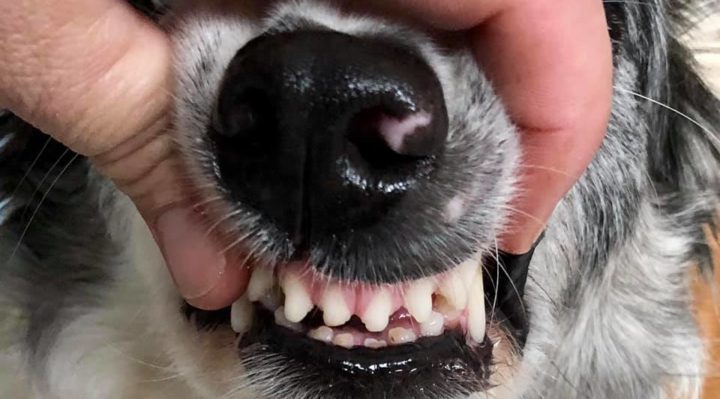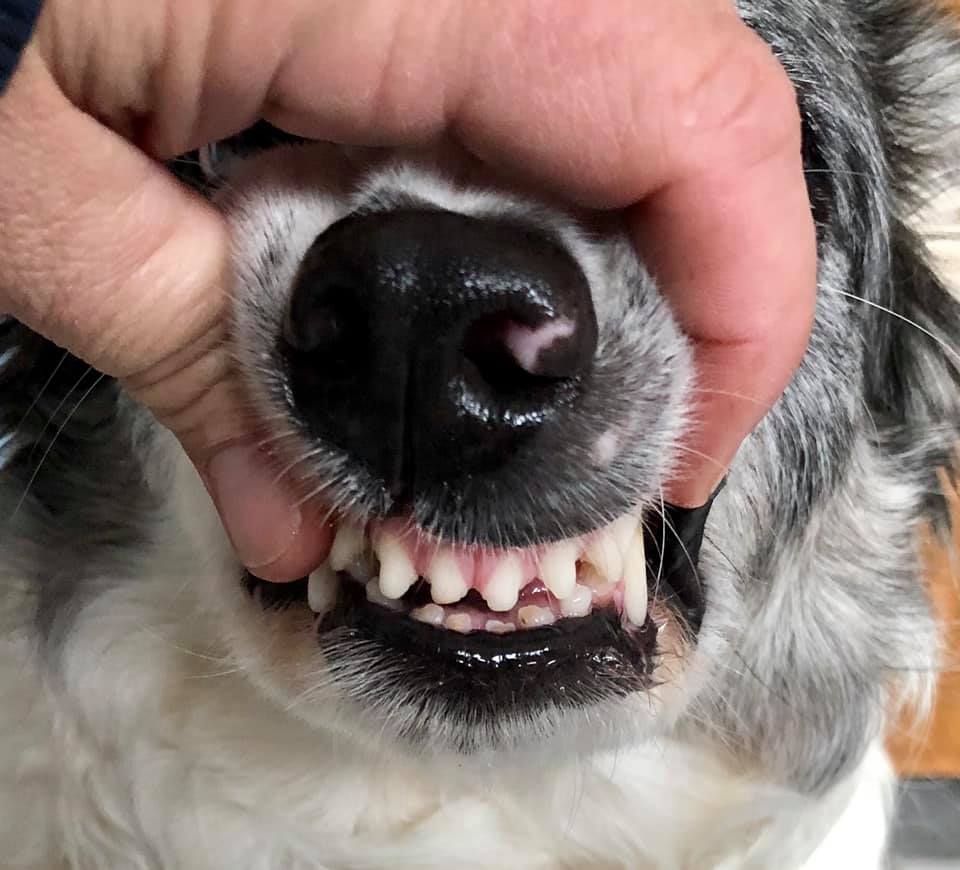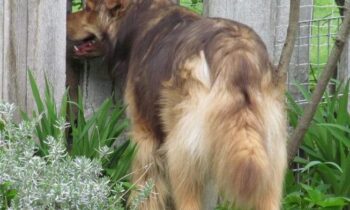
It’s been estimated that only 2 percent of dog owners brush their dog’s teeth daily, despite recommendations from veterinarians across the United States. The American Veterinary Medical Association reports that 80 percent of dogs have some kind of oral disease by the age of three.
Do you brush your dog’s teeth? I asked dog lovers and dog professionals that question.
Ann McQuillen (California) Nope . . . raw feeder and my dogs get raw bones. Never need to do that.
Sarah Adams (Oregon) No. I’m lazy, and their teeth are fine.
Inna Krasnovsky (New York) I brush both my dogs’ teeth every single morning and use a dental scaler weekly. They have excellent teeth for senior dogs (11 and 9).
Marni Fowler (Florida) Nope. Never have. Have always fed raw/home-cooked and have never needed to.
Jill Gibbs (Montana) I wish I did it more often, but usually just before a dog show. Have to show those pearly whites to the judge!
Denise Gregg (New York) I do NOT brush my dogs’ teeth. They are fed a hard kibble along with many biscuits. A couple times a week, they are given bones to chew on!
Cherie Marshall (Washington) No. Why? Because Fred says, “Don’t even consider it. This would end poorly for you!”
Kim Gehr (Virginia) No. I feed raw and they have raw bones regularly. No need for teeth brushing.
Michele Lupica Peters (Ohio) Should I? Yes. Do I? No, because I’m lazy. I’m very lucky that they like to chew.
Erin Saywell (Maryland) Nope, never have. I give them all sorts of things to chew and so far, so good.
Mary Tichenor (Wisconsin) Electric toothbrush once a week and I do a thorough job.
Lynn Brezina (Illinois) No. I give mine frozen raw bones.

Photo by Denise Gregg
Nancy Jones Gansinger (Illinois) Mostly laziness—but we feed dry food and an occasional (very occasional) teeth-cleaning bone. Vet has always said she has good, clean teeth.
Kimberly Kelly (California) Yes, but not as dedicatedly as my Search And Rescue partner Chuck. He does it twice a day, every day, with his dog Quiddy. And yes, we give raw bones, too, but it’s not a one-or-the-other only option.
Christine Hale Vertucci (Illinois) I brush my dogs’ teeth to keep them healthy and to avoid the cost of a dental cleaning.
Ski Tamborski (Colorado) Vet said they needed attention. Eight months ago, I started CET toothpaste by finger. A month ago, switched to finger brush. Yesterday, started the Cookie Monster toothbrush.
Genevieve Dever (Michigan) I do not and I wish I did. Have done it very occasionally in the past but not recently. I know it makes a difference.
Eileen Anderson I brush my dogs’ teeth. My 11-year-old is one of those dogs who gets a lot of plaque. She has partial facial paralysis and drools a lot. It gets on her legs and she grooms them frequently. Then she gets hair stuck between her teeth. I have been brushing daily since her last dental (two months ago) and I don’t see any plaque yet. And no gross hairs, thank goodness.
Amy Suggars (Ohio) Yes, I do brush KD’s teeth. She is almost three years old and her teeth are sparkling white. I am trying to keep them that way! Our ritual is that her teeth get brushed after I brush mine in the morning. She actually comes over and sits by the sink and patiently waits her turn!
My vet is a veterinarian dentist and he is a big advocate of brushing.
I was using an additive in the drinking water for my older dogs. The plaque on their teeth was significant and the additive did help to reduce it noticeably. But I decided when I got KD that I would prefer not to have her ingest a chemical in her water for a significant portion of her life. So brushing it is! She also gets the occasional raw marrow bone to chew.
I’m trying to be a better owner for KD!
Lori Leah Monet DVM (Colorado) Brushing a dog’s teeth is a great idea. To be honest, most owners are not that dedicated. Even so, doing everything we veterinarians ask owners to do reduces plaque and tartar less than 5 percent. There is a lot of genetics involved, too. Smaller dogs make more tartar than large dogs (it actually has to do with the amount of saliva they produce). Dogs with bad or odd bites make more tartar, so chihuahuas and poodles make more. Brachycephalics need more cleaning. The bone thing works only for the teeth the dog uses to chew or scrape. I am not a fan of scraping the teeth with metal instruments because it scratches the enamel and makes grooves that retain food and bacteria and increases tartar build-up. Simple brushing daily does help, but doesn’t totally stop plaque and tartar.
Debi Davis (Nevada) Six years ago, you educated me on pulse antibiotics for severe perio problems on my papillon, and those loose teeth did indeed firm right up from the scar tissue, just as you said they would if I followed the brushing routine and the antibiotics. I get full mouth X-rays with every vet dental and the teeth are all doing great. I owe you big time, Lori! And those 17 teeth the first vet said my dog needed to lose? Still there, and now firm enough to chew without pain. You’re so right about small-dog dental problems.
Lori Leah Monet DVM (Colorado) Very few people have the drive to do all you did, Debi. Most would rather wait and then need radical dental repair or removal. I don’t pull teeth that can be saved. If there is 50 percent bone and root, I clean them. And if the owner (see Debi’s comment above) is willing to do the work, the teeth can be saved. But if they don’t brush after the cleaning, those teeth will eventually lose adherence and fall out—like the Pomeranian I saw today . . . it has one tooth left!
Frances Dauster (Alabama) What is your take on beef tracheae? I have found them the equivalent of the second coming of the dental savior. I’ve seen boarders with CRAPPY teeth get decent teeth in just a few tracheae . . . almost magic!
Lori Leah Monet DVM (Colorado) Cartilage may help, but that’s all mechanical. You need chemical, too. Mechanical alone works only on the teeth physically being used to chew. I’m for anything that reduces the callus formation. The new human rinses and pastes work great for us because we spit. If we could get dogs to rinse and spit . . .
Tooth brushing can be a positive part of caring for your dog! Next week, how to start daily dental care for a puppy or an adult dog—choosing the right equipment and going slowly, force-free and fear-free.
National Pet Dental Health Month (American Veterinary Medical Association)
https://www.avma.org/events/national-pet-dental-health-month



